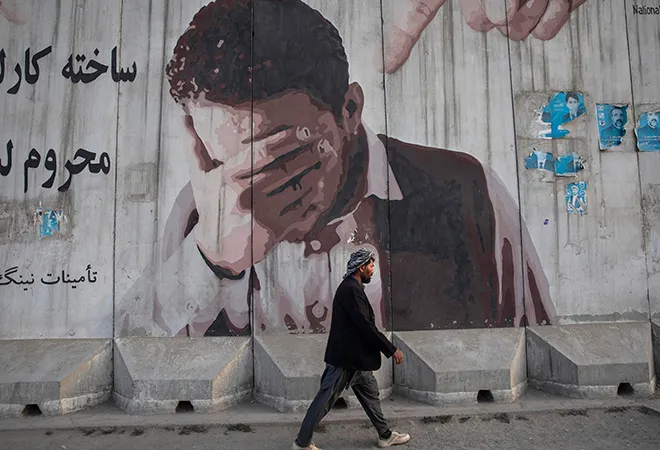-
CENTRES
Progammes & Centres
Location
For Washington, war weariness has set in deep.

The preliminary results of the Afghanistan election are released and it seems incumbent President Ashraf Ghani is set for another term, which will surely be filled with great political uncertainty and risk. The Trump administration is likely to go ahead with its long pending plan to remove 4,000 soldiers from Afghanistan, as negotiations with the Taliban while ongoing, are unlikely to make major progress until Washington begins to wind down its engagement in the country.
The electoral process, while an essential part of Afghanistan’s new democratic government, has severe institutional, procedural and bureaucratic flaws that will take decades to fix and improve. The presidential election were held after much delay in September 2019 with over nine million people casting their votes for the fourth time since 2004, when the US held fresh elections after toppling the Taliban government. Soon after all the votes were cast, both Ghani and his political rival Abdullah Abdullah declared victory. An easy trick that would allow them to contest the elections should it not turn out their way. Abdullah, whose position as CEO of Afghanistan was hastily arranged and cobbled together by then Secretary of State John Kerry in 2014 after the elections, has since accused the Election Commission of fraud and lack of transparency. Ghani’s slim majority of 50.64% of the vote, over Abdullah’s 39.52% means that his political future still hangs precariously. Unfortunately, the consistent bickering and posturing amongst the Afghan political elite leaves one to wonder whether they will have any moral fortitude and sense of duty towards peace and the future of the country.
For Washington, war weariness has set in deep. Eager to leave Afghanistan after nineteen years, the US first sat across the negotiating table from the Taliban in September 2018, and began discussing what it would take to end the war. By July 2019, the talks which had until then excluded the Afghan government, seemed to be leading to a deal where the US would begin a phased withdrawal of its 14,000 troops over sixteen months, and the Taliban would promise to never allow al-Qaeda to return and prevent any group in the country from attacking the United States. However, repeated attacks by the Taliban while negotiations have been ongoing have led to pauses, cancellations of summits, ‘restarts’ in talks, leading to a loss of momentum. Nonetheless, negotiations and quiet diplomacy between the US and the Taliban sides has continued over the last few months, with the Afghan government doing its part to build at atmosphere of peace. President Ghani has made repeated calls for a ceasefire as the first step towards peace with the Taliban. Both sides engaged in a prisoner swap where Ghani announced the release of three Taliban members, including the younger brother of Sirajuddin Haqqani, the leader of the Taliban affiliate Haqqani Network; in return for two American University professors whom the Taliban had held hostage for three years.
While Ghani attempts to build bridges with the Taliban, simultaneously fending off political opponents, US policy in Afghanistan remains as confused and short sighted as it has ever been. Washington is operating under the assumption that once they leave, the government in Kabul will have enough legitimacy and public backing to have a dialogue with the people of the country and then, collectively, with the Taliban about the future. This while keeping their fingers crossed that the Afghan security, defence and intelligence departments will be able to hold and defend the country against Taliban and the Islamic State. The next one year will be crucial for Washington, as the first step towards the end of the Afghan war comes into play. With no convincing theory on what victory looks like, and an erratic and up-for-impeachment or reelection Trump, the US can only hope that was has been done is enough. For the time being, a partial withdrawal, does not guarantee that their military engagement in the country is over.
While they have been in Afghanistan for nearly two decades, Washington has not ‘won’ the war nor secured their national security interests. The Afghanistan Papers, a series of internal documents, interviews and secret memos obtained and released by The Washington Post early this month reveal the true nature of this “unwinnable war”. For decades, repeated administrations have failed at demonstrating adequate foresight as to what Washington’s end goal was in Afghanistan. The lack of clear objectives and long-term strategy, has furthered corrupt networks in the Afghan government, rebuilt a deeply rooted patronage system and strengthened a cadre of political leaders that are ambitious, petty and dangerous.
For the Afghan people, the cycle of death and destruction which is now central to their story, continues. Tales of wedding celebrations being bombed, children being killed, villages running out of land to bury their dead, families being torn apart, are now common place in the country. For Ashraf Ghani, nothing short of a country wide majority and consensus will give any Afghan government legitimacy and public backing to take on the Taliban. It is one matter to hold them off and prevent them for gaining more territory, it is a completely different matter to defeat the Taliban ideologically and present a strong case for democratic institution building, while accommodating to Taliban demands in some way, shape or form. With the US preparing for their inevitable departure, now is the time for political leaders in Afghanistan to set aside past quarrels and come together, as the future of their country depends on it.
The views expressed above belong to the author(s). ORF research and analyses now available on Telegram! Click here to access our curated content — blogs, longforms and interviews.

Kriti M. Shah was Associate Fellow with the Strategic Studies Programme at ORF. Her research primarily focusses on Afghanistan and Pakistan where she studies their ...
Read More +